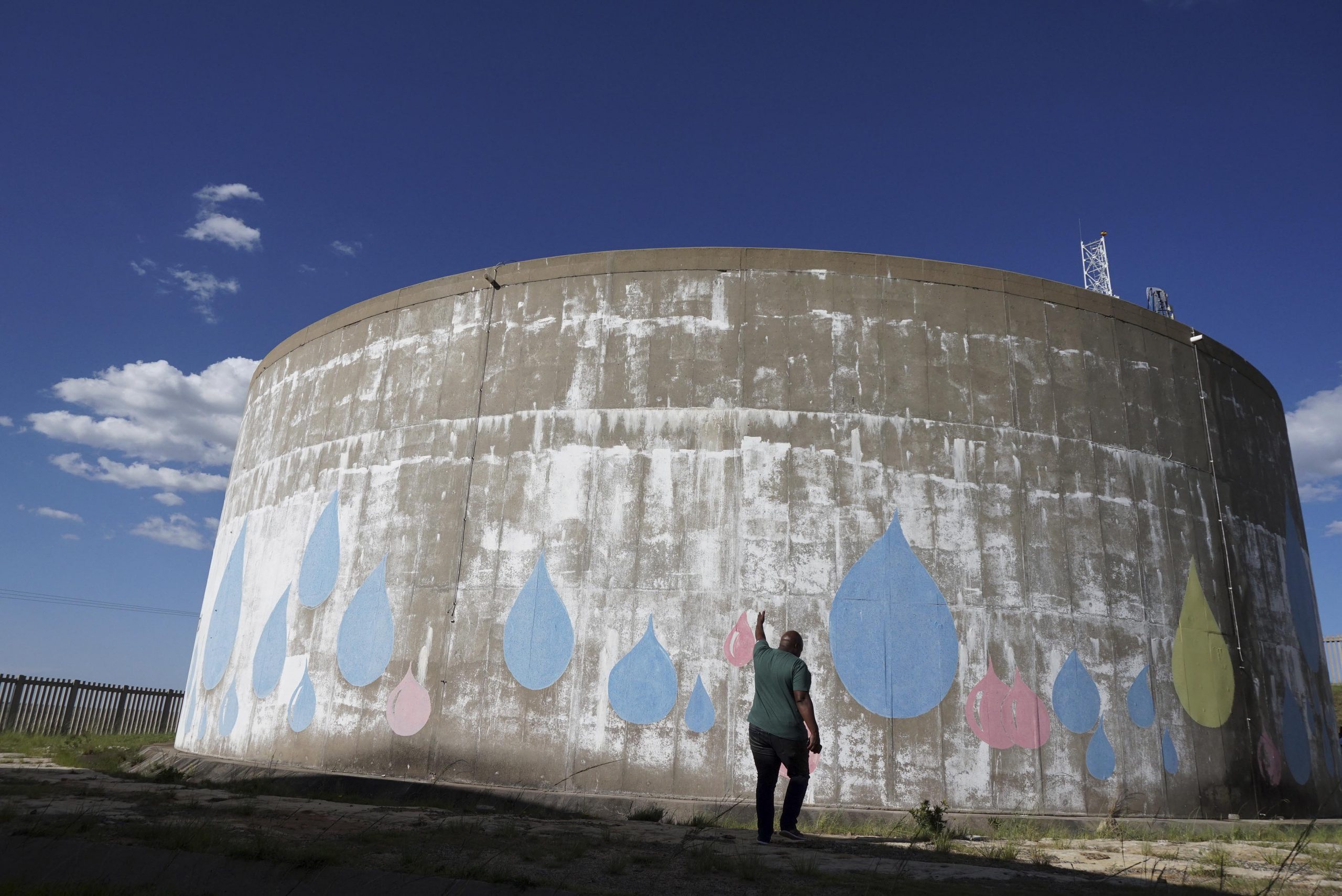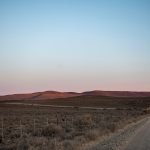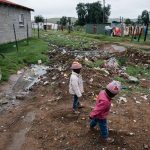QwaQwa water: punish the poor, enrich the powerful
The continuing water shortage in the eastern Free State has led to deaths and allegations by residents that infrastructure projects are being manipulated for profit and for political gain.
Author:
18 February 2020

Mosa Mbele’s framed photo from her Grade R graduation lies face down on the top shelf of a wall unit. In the picture, a wide-eyed little girl stares at the camera with her certificate in her hands.
Mosa’s mother, Phindile Mbele, 37, said looking at the picture of her dead daughter is an unbearable reminder not only of her loss but also of how the poor bear the brunt of shoddy water management in QwaQwa. Mosa, a seven-year-old Grade 2 pupil, drowned while fetching water with her sister Moleboheng, 12, on 18 January at a river on the edge of Mandela Park.
“If I had money I would have hired a car to get water for me but because I don’t work and we live on the child grant, we have to make ends meet,” Mbele said.
Related article:
Mosa’s death led to a steering committee being formed to help with processes to alleviate QwaQwa’s decade-long water emergency. Once set up, the committee will oversee the R220 million promised by Lindiwe Sisulu, the Minister of Human Settlements, Water and Sanitation.
According to Free State’s Department of Cooperative Governance and Traditional Affairs (Cogta), in the 2018/2019 financial year the municipality of Maluti-a-Phofung spent more than R7.5 million on bringing tankers of water to the sprawling community. In the previous year, it spent almost R7 million, and the year before that, it was close to R15 million.
Maluti-a-Phofung Municipality also governs Harrismith and Kestell. Together, the three towns have a combined population of about 335 784, with almost 80% of the population living in the former homeland of QwaQwa.

Water for a while
Five days after Mosa’s burial, Mbele points to the green JoJo tank next to her RDP house in Mandela Park. The tank was left by the municipality to help the family with water during the funeral.
“They [the municipality] are going to take the JoJo tank back, and we will be forced to go back to the river that took my child’s life,” Mbele said.
Many believe QwaQwa’s water problems have been left unchecked so funds can be directed into the pockets of politicians and their alliances in the region. Mosa’s death fuelled a week-long shutdown by frustrated locals. This is not the first time the community has turned to burning tyres and throwing rocks in protest. In 2016, locals also staged a shutdown over water.
Speakers demanded a meeting with the Free State MEC of Cogta, Thembeni Nxangisa, and Sisulu’s representative. The residents are mostly concerned about rampant corruption linked to water projects aimed at fixing the water crisis. They fear the money Sisulu allocates will end up in the wrong hands.

Decaying infrastructure
According to Moeketsi Lebesa, a member of the Maluti-a-Phofung mayoral committee for public safety and leader of the Dikwankwetla Party of South Africa, the infrastructure is “very old, decaying and grossly neglected”.
The municipality has three drinking water sources: Fika-Patso Dam, Metsi Matso Dam and Sterkfontein Dam. The first two dams receive water from tributaries in the Drakensberg escarpment, which supply both the Tugela and Vaal River catchments. Metsi Matso was built in the 1970s to supply water to the QwaQwa area. In 1986, the Fika-Patso Dam was added to provide water to 85% of QwaQwa for domestic and industrial use.
Lebesa says the government’s failure to clean clogged streams has contributed to Fika-Patso’s low water levels.
JoJo tanks are dotted through townships such as Phuthaditjhaba, Elite and Beirut and in villages tucked into the Drakensberg mountains edging the borders of the area. But the recent shutdown meant no tanks delivered water to the community, forcing locals either to buy water, travel long distances to collect it from a pipe in QwaQwa’s old industrial area or risk drowning in the many streams and rivers flowing near communities.
Related article:
As the sun sets over containers lining a slope leading to the old Mphatlalatsane bridge, residents queue in a long, winding row, hoping to get water. Here, people line up from as early as 5am to get water from an old water pipe located in the area’s decrepit industrial area. A group of eight boys aged between 12 and 19 use a hose to pour water into people’s containers.
The group makes paltry money. “We arrive here at 5am, and we leave at 8pm. We take the hose with us when we leave because they will steal it,” Thabo Matsose, 19, said.
On a good day, Matsose makes about R200 helping people fill their containers. He left school at grade 11 and lives with his grandmother in Mphatlalatsane, a shack settlement with concrete and zinc houses. “Some people pay R3, others R10. It differs.”
While some locals rely on carts and wheelbarrows to transport water, others pay local vendors for delivery to their homes. One such is Majoro Mahlomola, 47, who fills a 1 000-litre tank placed on the load-bed of his run-down van. The 1 000 litres will be sold to members of Chris Hani Park, an RDP settlement 40km from the water source. “People make orders, and I charge R6 for 20 litres of water. Sometimes I go around the community selling water,” said Mahlomola.
Mahlomola said those affected most by the water crisis are the elderly of his community. “Some people can’t afford to buy water because there are no jobs.”
Related article:
Frustrated with the daily reality of having no access to water, Mahlomola urged the authorities to upgrade the area’s water infrastructure and spend less money on water tankers. The locals’ desperation is evident in the many vehicles with mounted water containers seen throughout QwaQwa.
For heavily pregnant Mantoa Ramohlakoane, 29, embarking on the gruelling hour-long walk with a wheelbarrow to get water is a reality that cannot be avoided. Ramohlakoane lives in Section 3 of Mandela Park with four children and her ailing mother.
“I walk home, and I will take breaks on the way,” she said. When the water tankers don’t show up, she has to do this three times a day. “We have been living like this for more than 10 years but now it has gotten worse because the JoJo tanks are inconsistent.”

A collapsed administration
In February 2018, the provincial government placed the municipality under Section 139 of the Constitution because it failed to perform its constitutional and legislative obligations. This means the provincial government has broad powers to intervene in carrying out legislated duties. But its water woes are coupled with ageing electric and road infrastructures.
The municipal council has 69 seats, of which the ANC holds 37, the Economic Freedom Fighters nine, the Democratic Alliance five, the Dikwankwetla Party of South Africa four, the Unemployed Labour Alliance two and the African People’s Convention and the African Independent Congress one each. The remaining 10 were won by independent candidates during the August 2019 by-elections.
Some of the independent candidates include councillors who were expelled by the ANC for defying the party and allegedly voting with opposition parties in a motion of no confidence to remove former mayor Vusimuzi Tshabalala in 2018. The ex-mayor was accused of corruption and bringing services to a halt. Lebesa said that during his tenure Tshabalala awarded water tank tenders to close allies. “Those trucks are owned by people in high levels, and they use these young people to front.”
Related article:
Cogta spokesperson Zolile Lobe said there is a maximum of 30 trucks contracted by the municipality. He said although the water department has brought in 10 more, 80 are needed to keep up with the demand.
Sisulu, addressing a meeting at the University of the Free State during the shutdown, announced short-term measures to ensure a constant water supply, while a long-term plan to construct a dedicated water supply line is being considered.
These interim schemes, which will cost R220 million, include providing 5 000 state-owned tanks to QwaQwa to ensure at least one water tank for every designated area in the municipality. Government also committed to rehabilitating boreholes and deploying engineers to dams in the area for assessments and recommendations. Although Lebesa approves of the rehabilitation of boreholes, he criticised the administration for failing to complete three reservoirs left unfinished in 2006.
But it is the R2.1 billion water project mentioned by Sisulu that Lebesa said is the reason the water shortage has been allowed to continue for so many years. Nomvula Mokonyane initiated the project during her time as water and sanitation minister.
“For the long term, there is a consideration of a pipeline from the Sterkfontein Dam, which will cost R2.1 billion. Sedibeng Water will do a feasibility study to ensure the realisation of this plan,” Sisulu explained.
“The water crisis in QwaQwa is caused by people who want to overtake a very expensive project. They want to merge Sterkfontein, Fika-Patso and Metsi Matso dams. The project will not be feasible looking at the topography of the area,” Lebesa said. “The project will benefit the politicians.”

Impact on health facilities
Health facilities and business are also struggling with delivering day-to-day services.
Patients at QwaQwa’s 300-bed Mofumahadi Manapo Mopeli Hospital often experience water restrictions. The hospital’s CEO, Balekile Mzangwa, said, “Irrespective of the circumstances, the rights of the patients must be taken care of.”
The hospital relies on four 10 000-litre tanks and a borehole to keep operations running. “The JoJo tanks are filled by the municipality, and we have to be begging them time and again because they don’t stick to the schedule,” Mzangwa added.
Despite administrative challenges, the hospital has not stopped providing level-two services, such as operations. To keep the hospital running, the maintenance staff has to take water to the wards on the second and third floor.
“It’s difficult to run a hospital without water because essentially a hospital needs running water to avert problems of infection control,” Mzangwa said.
He denied allegations that patients are expected to get water from the JoJos, saying only discharged mothers waiting for their babies who are still in hospital are permitted to get water from the tanks.
According to Mzangwa, community members and hospital staff also rely on the tanks for water.





